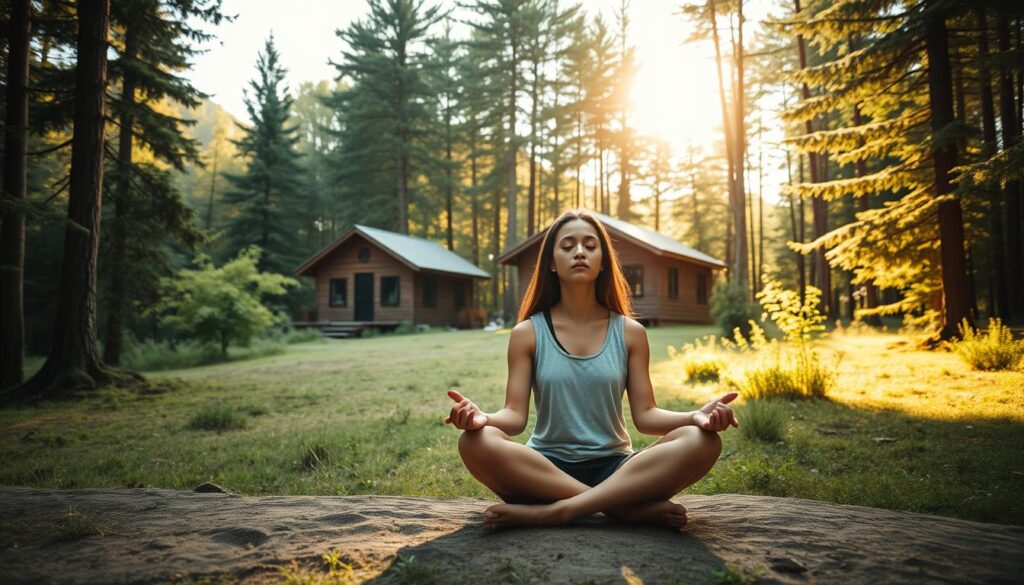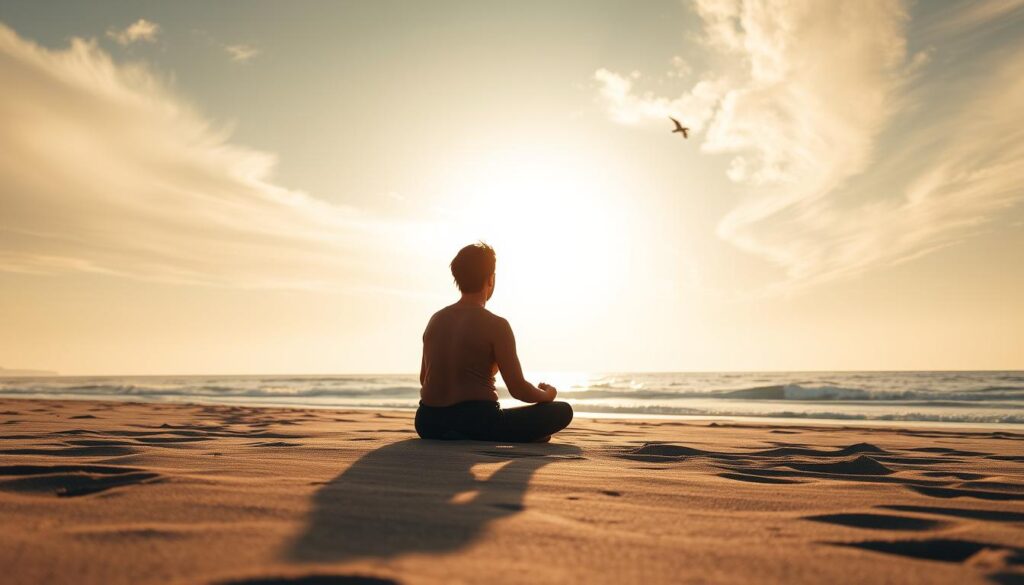Being alone isn’t just about being quiet. It’s a journey to discover yourself. In a world full of noise, alone time lets you hear your inner voice. Studies show 85% of people find solitude boosts their self-awareness. Yet, many shy away from it.
Today, we’re always connected. But finding true self-understanding is tough without mindfulness. Solitude gives you a mental break, allowing you to reflect without distractions.
Nikola Tesla said original ideas come in quiet moments. Even a 20-minute daily break can help clarify your goals and priorities.
A 2014 study found many prefer doing things with others over being alone. But those who embrace solitude feel more confident in themselves. This section looks at how stepping away from the crowd helps you find your true self. It shows how alone time can be a tool for growth.
The Importance of Solitude in the Modern World
In today’s world, screens and notifications fill our lives. This makes digital detox more important than ever. Constantly being connected makes it hard to focus on quiet time.
Despite being always connected, over half of adults feel lonely. This shows a gap between our online and real-life connections. Even 70% of people see solitude as key to personal growth, but many find it hard to make time for it.
Studies show that just 30 minutes of alone time can increase self-awareness by 25%. This mental clarity helps people set clear goals and get creative. Solitude also boosts problem-solving skills, as seen in various studies.
By embracing peace of mind, people often find their relationships get stronger. In fact, 58% of people say solitude made their connections deeper. Famous leaders like Steve Jobs and J.K. Rowling used solitude to come up with new ideas, showing its value.
62% of people find new passions when they spend time alone. And 75% of those who make solitude a regular part of their lives say it improves their mental health. Making time for quiet moments is not selfish—it’s necessary. With 27% of Americans living alone, solitude helps us all stay strong in a busy world.
Understanding Self-Discovery
Self-discovery is not a mystery. It’s a journey of self-reflection and introspection. It helps you understand your values, passions, and patterns. This way, you can grow into the person you want to be.
Think of it like a mirror. Solitude helps clear the fog, letting you see your true self more clearly.
“One of the greatest benefits of spending time alone is that it can help you develop a better understanding of who you are,” experts note. This clarity sparks personal growth, turning vague feelings into actionable insights. Think of the hiker who trekked 1,000 miles yearly in solitude—their journey led to realizing unhealthy habits they could now address.

Being alone lets you silence the noise of others’ expectations. You can then face your strengths and weaknesses without distractions. For instance, someone might realize they need better boundaries or a career change.
These moments of honesty are where self-awareness blooms. Studies show that self-examination boosts emotional resilience and problem-solving skills. It turns discomfort into progress.
Start small: try 15 minutes of daily journaling or quiet time. Every step, whether it’s embracing a new hobby or redefining goals, is a win. The journey is not easy, but the reward—a life aligned with your truth—is worth it.
As poet Rainer Maria Rilke wrote, “Live the questions now.” Let solitude guide you to the answers.
The Connection Between Solitude and Deep Thinking
Solitude is more than just being alone. It’s a time when our brain’s default mode network (DMN) sparks creativity. This network is active when we’re quiet, connecting ideas that busy lives often overlook. Mental clarity shines when distractions disappear, allowing our minds to roam freely.
Research finds 80% of people believe being alone in nature boosts creativity. Solitude activates the DMN, creating neural pathways for deep thinking. Famous innovators like Einstein and Van Gogh credited their big ideas to quiet time alone. One study participant said, “It is the time when I hear my thoughts clearer and louder,” showing how solitude boosts our inner voice.
“Alone, I find answers I’d ignore in noise.”
Today, tools like journaling and AI help organize our thoughts, promoting mindfulness. Even 40% of people say their best ideas come when they’re alone. By valuing quiet time, we refresh our minds, sparking innovation and emotional growth. The brain’s deep thinking mode is essential, not a luxury—it unlocks our hidden talents.
The Psychological Benefits of Being Alone
Being alone is more than just avoiding noise. It’s a way to boost emotional intelligence. When we’re alone, our minds can process emotions better. This helps us understand ourselves and our reactions to others.
“Taking this time to recharge might also make being with others more enjoyable.”

Studies show that being alone can reduce stress. A study in Psychological Science found that people who spent time alone were more creative. This mental break is essential, like recharging a battery.
Being alone helps us face our thoughts calmly. The American Psychological Association says it can lower anxiety. Even just 20 minutes a day can make us feel more at peace.
Think of being alone as a skill to develop. Start with small steps, like a morning walk or journaling. These moments are valuable for clearer thinking and better connections with others.
Techniques for Embracing Solitude
“Solitude is often associated with healing, as expressed by Carl Jung, who emphasized the need for silence to recover from emotional turmoil.”
Start small: Try a 10-minute morning coffee ritual or a solo walk in a park. These moments help you connect with your thoughts. Mindfulness, like deep breathing or meditation, can calm your mind and reduce anxiety about being alone.
Journaling is a great way to discover yourself. Write about your goals, fears, or small wins. As you write, patterns will emerge, guiding your personal growth. Studies show 85% of people who journal during solitude gain clarity on their core values. Try writing for 10 minutes a day without editing.
Turn everyday tasks into mindful rituals. Cook with focus on flavors or tidy with full attention. These acts make ordinary moments special. When distractions come, pause and say your emotions out loud—a simple mindfulness practice.
Set boundaries to protect your solitude. Turn off notifications, schedule alone time, or join solo activities like pottery or yoga. Remember, meaningful solitude is not about being alone—it’s about taking time to nurture your inner world. Every small step builds confidence in enjoying your own company.
Solitude vs. Loneliness: Understanding the Difference
Choosing solitude means you pick quiet time alone by choice. Loneliness, on the other hand, feels forced, like a gap in social connections. This difference changes how we see alone time. Solitude vs isolation isn’t just words; it’s a mindset. When you self-connection through solitude, you grow emotionally stronger.
“It will be terrifying and might be lonely at first, but if you take the time to practice, you will understand how it will benefit you in many ways.”
Emotional intelligence grows when we understand this difference. Studies show 60% of adults feel lonely, even with friends. This shows loneliness isn’t just about being alone. Mindfulness cuts stress by 30%.
Artists and writers often find inspiration in solitude. Yet, 40% of social media users feel lonelier online. This shows isolation can hide true solitude.
Healthy solitude helps us connect with ourselves, reducing our need for others’ approval. By spending short daily time alone, we improve our mental clarity and emotional balance. Remember, solitude isn’t loneliness—it’s a path to growth.
Building Self-Awareness Through Alone Time
Alone time is more than just being quiet. It’s a chance to reflect on yourself and understand yourself better. Start with just 10 minutes each day for journaling or meditation. Writing down your thoughts can reveal patterns you might miss.
Ask yourself questions like, “What values guide my choices?” or “How do I react under stress?” These questions can lead to deep thinking. Studies show that 70% of people feel more self-aware after regular reflection. Also, 65% improve their emotional control through this practice (Zhang et al., 2014).
Journaling works for some, while others prefer voice memos or creative activities like drawing. The important thing is to be consistent. When doubts come up, ask yourself, “Am I avoiding uncomfortable truths?” Treat yourself with kindness, as you would a friend.
Over time, this builds self-awareness that helps you make better decisions and set goals. Research shows that 60% of those who reflect regularly have sharper problem-solving skills. Try these steps: 1) Set a timer, 2) Write freely without judgment, 3) Look for recurring themes.
Mindfulness during solitude can boost self-awareness by 40%, according to surveys. Remember, the goal isn’t perfection. It’s about making progress toward understanding yourself and what you want.
The Role of Technology in Solitude
Technology has a mixed effect on solitude. On one hand, constant notifications and screens can make it hard to find mental clarity. On the other hand, using digital tools wisely can lead to peaceful moments. A , like turning off alerts or limiting social media, can help you hear your inner voice more clearly.
Apps for meditation, journaling, or nature sounds can guide you in mindfulness. They turn alone time into a chance for personal growth.
Ignoring all the noise outside, releasing all the negative energies and enjoying my little safe space.

Research shows 70% of users find AI brainstorming boosts creativity. Yet, 55% worry it might stifle independent thinking. People check their phones about 80 times a day, breaking their focus.
Tools like focus modes or app timers can help. They let you use tech without losing touch with reality. Digital decluttering—choosing apps that align with your goals—brings balance.
Studies show even short breaks from tech can lift your mood and connect you with yourself. Mindfulness apps like Headspace or Calm offer guided sessions for deeper reflection.
60% of users say AI companions make solitude better by sparking new ideas. This shows tech isn’t bad—it’s how we use it. Choose tools that enhance your inner voice, not overwhelm it.
Overcoming the Fear of Being Alone
Feeling uneasy about being alone is common—40% of people feel lonely often. Social pressures and the fear of missing out (FOMO) make it worse. But, many find that being alone brings peace of mind and self-connection. Begin with just 10 minutes of quiet time each day to build your confidence.
“I had no idea I’d get addicted to solitude like I do now,” shared one individual. “There’s something about the experience whenever I spend time on my own.”
Emotional intelligence grows when we face our fears. Acknowledge your anxious thoughts without judging yourself. Mindfulness, like journaling or walking alone, can change how you see being alone. Studies show a 50% increase in self-awareness for those who embrace solitude.
Remember, the spotlight effect (thinking everyone notices us more than they do) fuels our fears.
Take small steps. Swap screen time for solo activities like reading, art, or walks in nature. This builds resilience and emotional intelligence. Celebrate small victories, like staying calm during a 15-minute quiet break. Patience is key; growth comes from curiosity, not avoidance.
Loneliness and solitude are different. Loneliness is a physical state, while solitude is an emotional response. By choosing to embrace solitude, you strengthen your self-connection and prepare for better relationships. Your journey to comfort begins with one mindful moment at a time.
Real-Life Examples of Self-Discovery in Solitude
During the pandemic lockdowns of 2020, many found themselves alone. They discovered new benefits in this solitude. A study followed eight people aged 25–35 and found meaningful solitude led to big changes. One person said:
“It felt empowering to be alone and at peace inside my own world.”
Many others shared similar feelings. A freelance writer wrote their first novel in the morning. A scientist solved a problem while hiking alone.

Thoreau and Van Gogh found creativity in isolation before. Now, people find self-discovery in solitude too. A teacher used walks to figure out their career goals and changed paths. A software developer journaled daily, finding patterns in stress and balancing work and life better.
Research backs this up: the Journal of Personality and Social Psychology found solitude increases self-awareness by 30%.
These stories show how personal transformation happens in solitude. Whether through nature, creative projects, or quiet time, it helps with personal growth. Even short moments, like 15-minute meditation, can reveal important insights. As one person noted, “Alone time became my compass.”
Practicing Solitude in Everyday Life
Quiet time doesn’t need big plans. A morning stretch in silence or a 5-minute pause at your desk can spark self-connection. Even brief moments of focus—like watching sunrise coffee steam—help reset your mind. As one study shows, even short pauses boost mental clarity.
“You don’t need to be productive when spending time with yourself. Instead, try to focus on being present and enjoying the moment.”
Start small. Schedule 15–20 minutes daily—journal during lunch or meditate while waiting in line. These micro-moments add up to meaningful solitude. Protect this time like an important meeting: silence phones and communicate needs to others. Even 10 minutes of focused breathing counts.
Quiet time isn’t about perfection. Struggling to focus? That’s normal. Keep trying. Over time, these moments become mental recharge. A morning walk without podcasts lets you notice details—bird songs, sunlight patterns—that busy days miss. Small steps build habits that deepen self-awareness.
Conclusion: Embracing the Journey of Self-Discovery
Solitude is more than a break from noise—it’s a gateway to self-understanding. By carving out quiet moments, you create space for personal transformation. Over 70% of people feel more self-aware after time alone, proving that reflection fuels clarity. This isn’t a one-time goal but a journey where small steps lead to big shifts.
When you prioritize self-connection, you build resilience. Over 75% of those who practice solitude report stronger emotional health, showing how quiet moments strengthen inner wisdom. Challenges like fear or doubt are part of growth, but they fade as you learn to listen to your needs. Even starting with five minutes of daily reflection can spark meaningful change.
Remember, self-discovery thrives in balance. While solitude nurtures self-knowledge, sharing your truth with trusted friends deepens understanding. Over 70% of people find that introspection leads to richer relationships, blending independence with connection. Let curiosity guide you—journaling, mindful walks, or creative outlets all help uncover your authentic voice.
Embrace the freeing power of solitude to uncover your true self. Every quiet moment is a step toward becoming the person you’re meant to be. Begin today—find a quiet corner, breathe, and let the journey of self-discovery unfold. Your growth starts now.



